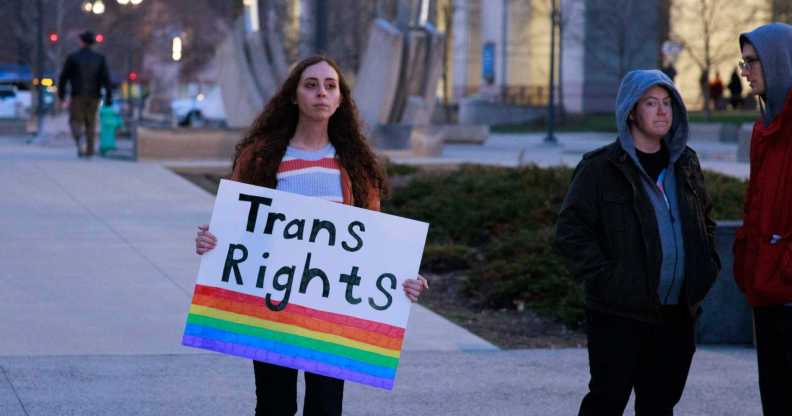Judge blocks Indiana’s ban on gender-affirming care for trans youth

Federal judge blocks Indiana ban on reversible puberty blockers and hormones for trans youth from taking effect. (Getty Images)
A federal judge has issued an order blocking an Indiana ban on reversible puberty blockers and hormones for trans young people from taking effect.
The ban was scheduled to take effect on 1 July, but a temporary injunction was sought by the American Civil Liberties Union of Indiana (ACLU).
US District Court judge James Patrick Hanlon ordered that although the ban on gender-affirming surgeries would stand, he also blocked Indian doctors from being prohibited from communicating with out-of-state doctors about gender-affirming healthcare for patients under the age of 18.
Currently, gender-affirming surgery for minors is already not legal in the majority of countries around the world, including the US and UK, so the ban on surgeries will make no difference to youth in the state.
The Republican-backed bill was signed by governor Eric Holcomb on 5 April, after the state’s legislature heard many emotive arguments against it, with testimony demonstrating that gender-affirming care reduces the risk of depression and suicide among youth experiencing gender dysphoria.
The World Health Organisation has stressed its importance in protecting the lives of trans youth.
Judge Hanlon, appointed by indicted former president Donald Trump, wrote that he was blocking the law from taking effect due to the potential “irreparable harm” it could cause to trans youth, and how arguments that the ban is unconstitutional showed “some likelihood of success”, the Associated Press (AP) reported.
The ALCU’s lawsuit was filed mere hours after signing of the bill, and the challenge was placed on behalf of four young people receiving gender-affirming care and one Indiana doctor.
The ALCU had provided “evidence of risks to minors’ health and wellbeing from gender dysphoria if those treatments can no longer be provided to minors – prolonging of their dysphoria, and causing additional distress and health risks, such as depression, post-traumatic stress disorder and suicidality,” Hanlon said.
“While the state has identified legitimate reasons for regulation in this area, the designated evidence does not demonstrate, at least at this stage, that the extent of its regulation was closely tailored to uphold those interests.”
In a statement, Ken Falk, legal director of the ACLU of Indiana, said: “We won’t rest until this unconstitutional law is struck down for good.”
In 2023, the US has seen a wave of repressive anti-LGBTQ+ legislation sweep the nation from GOP-led states, much of it targeting trans people.
Florida, North Dakota, Nebraska, Oklahoma and Missouri have all approved bans on gender-affirming care for transgender youth.
The Indiana bill’s sponsor, Republican representative Joanna Kind, said that the ban would “protect our children from irreversible, harmful, life-altering procedures” while the legislation was being debated.
Republican state attorney general Todd Rokita’s office said in a statement that “we will continue to fight for the children” after the judge’s ruling. It is unclear whether Rokita’s office intends to appeal the injunction.
Readers affected by the issues raised in this story are encouraged to contact Samaritans free on 116 123 (www.samaritans.org) or Mind on 0300 123 3393 (www.mind.org.uk). Readers in the US are encouraged to contact the National Suicide Prevention Line on 1-800-273-8255.

